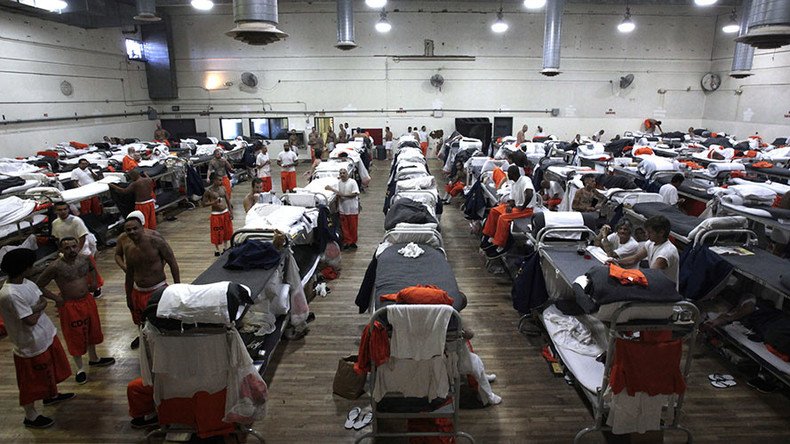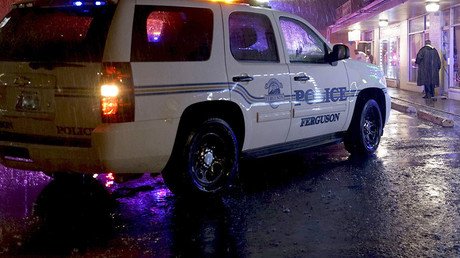Human Rights Watch report finds US violations, signs of reform in criminal justice

The annual World Report from Human Rights Watch lauded the US’ “vibrant civil society,” but found plenty of room for improvement as well, calling for further reform – especially in criminal justice, policing, and the detention of immigrants.
While recognizing the US’ “strong constitutional protections for many civil and political rights,” HRW noted that government abuses are most likely to affect “racial and ethnic minorities, immigrants, children, the poor, and prisoners.” Though the report looked at a number of categories, it was criminal justice and its ancillary issues where problems and reform efforts surfaced the most.
Prison overpopulation
Before getting into the particular demographics suffering most under criminal justice abuses, the 2016 World Report considered some broad figures. There are currently 2.37 million inmates nationwide, and while that is less than 1 percent of the national population, it is the largest prison population of any country in the world. The report attributes much of the prison overpopulation problem to lengthy sentences, most notably mandatory minimums. It also counts 12 million people jailed on the local level every year.
Chances of Obama closing Gitmo slim to none – human rights lawyer
https://t.co/OdhlAgOhmlpic.twitter.com/hxfWeIjHrj
— RT America (@RT_America) January 27, 2016Racial disparity
While African-Americans represent 13 percent of the national population, their representation more than doubles in terms of drug arrests (29 percent), even though white people are equally likely to violate drug laws. In the prison population, black males outnumber white males by a rate of six. In citing the Department of Justice report on Ferguson, Missouri last year, HRW attempted to show where improvement could be made.
Capital punishment
The death penalty, while still legal in 32 states, was only carried out by seven in 2014, the report found. In 2015, all 27 enforced death sentences were carried out via lethal injection. The report cited the Connecticut Supreme Court’s August 2015 ruling that capital punishment was unconstitutional as progress, as well as the US Supreme Court ruling in June that Oklahoma’s process for carrying out lethal injections was unconstitutional.
It also highlighted a less promising development in Utah, where state legislators reinstituted death by firing squad for capital punishment last year.
Solitary confinement
The HRW report estimated that 100,000 prisoners in state and federal facilities are kept in isolation, though it also recognized reform in California, where a lawsuit concluded with the state ending its use of solitary confinement in the supermax Pelican Bay State Prison, while also shortening the amount of time other state prisoners face when subjected to similar punishment.
The poor suffer more in the criminal justice system
Without citing figures, the report observed that when individuals are charged and awaiting trial, their income level often determines whether or not they’ll be detained in jail when bail money is the only way to avoid it.
The report used the case of 22-year-old Kalief Browder as an example of what happens when the poor can’t afford to make bond, which also serves as an example of the danger of prolonged pretrial detentions and solitary confinement. Browder hanged himself to death in June after long bouts of depression during and after his three-year stint in the New York City prison Rikers Island, where he was in pretrial detention from age 16 to 19, mostly in isolation. Browder’s bail was set at $3,000, which was simply unaffordable for him.
The New York City Council has started a bail fund since then and is developing services related to pretrial detentions, the report noted. Elsewhere, a lawsuit over money bail is ongoing in San Francisco, and in Connecticut Governor Dannel Malloy has urged the state to review its money bail policy. The report also noted that a new law in Georgia limits what private probation companies can charge their customers.
Youth in criminal justice system
The HRW report laments that 14 states have no minimum age requirement for prosecuting a defendant as an adult. Some have limits, but they’re as low as 10, 12, or 13 years of age, while other states automatically charge anyone 14 or older as an adult. Prosecutors, not judges, may decide whether or not to charge a youth as an adult in 15 states.
The report noted there are tens of thousands of underage inmates in adult prisons and jails, but places hope in incremental progress, citing New Jersey, which has raised its minimum age from 14 to 15, and California, which “improved the statutory criteria judges use in transfer hearings.”
Police killings
The HRW report scantily covers police killings, primarily because of the lack of data available on the subject. Despite a new federal law providing states with incentives to maintain records on police killings of civilians, it “fails to ensure reliable data on people killed by police,” the report said.
Drug reform
The HRW report noted that over 6,000 inmates convicted of drug charges were released in October, after the US Sentencing Commission retroactively shortened drug sentences it deemed too long.
Immigration
In its coverage of the human rights of immigrants, the HRW report mentioned the Obama administration’s effort in June to limit detention lengths for mothers and children trying to gain refugee status. Additionally, it observed that the White House had ended individual detention as a means of deterrent. A judge found in July that the US policy for detaining families violated a 1997 settlement regarding detention of child migrants.
S. Arabia & Qatar among top US arms buyers despite human rights abuses (VIDEO) https://t.co/DW0eXaaRuk@Gayane_RTpic.twitter.com/86SZ8caD6B
— RT America (@RT_America) January 6, 2016The report also noted HRW’s own reporting from June 2015 that documented the deportation of legal permanent residents as well as illegal immigrants who were convicted of drug crimes. Three individuals missed out on some of the reforms that had benefited their US citizen counterparts.
Other reforms from the White House
Two criminal justice reforms and one policing reform from President Obama in the last year were included in the report as well. Obama’s sentencing commutations for 86 prisoners, all but 10 of whom were convicted of drug crimes, and the administration’s move to reconsider solitary confinement rules were also mentioned.
On the militarization of police, the Obama-created Law Enforcement Equipment Working Group made recommendations on how surplus military equipment could be passed on to local law enforcement organizations.













